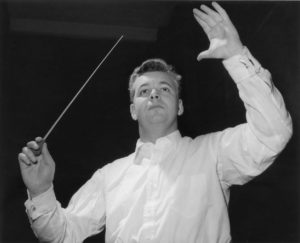Victor Feldbrill (1924–2020)
The eminent Canadian musician Victor Feldbrill died in Toronto on June 17, 2020 at the age of 96. He is remembered by generations of Canadian music lovers for his outstanding services to music in Canada, which stretched over a period of some 75 years. A dedicated orchestra builder, he devoted much of his professional energy to educating young musicians in Canada and Japan, and led professional orchestras around the world as a guest conductor.
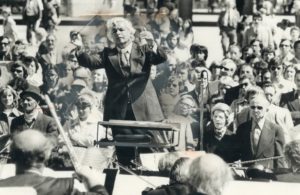
Feldbrill was born in Toronto on April 4, 1924 to Nathan Feldbrill and Helen Lederman, Jewish immigrants who had arrived in Toronto in 1920 from their native Poland. The family later grew to include two daughters, Ruth and Eileen.
Feldbrill’s initiation to music making came at the age of nine with the family’s purchase of a violin for him, which led to lessons with Sigmund Steinberg, a member of the Toronto Symphony Orchestra with whom he studied from 1936 to 1943.
When Feldbrill began secondary school studies at Toronto’s Harbord Collegiate in 1937, he had already amassed valuable orchestral experience; he had formed a string ensemble at King Edward primary school and had played with the Toronto Secondary Schools Symphony Orchestra. Harbord was renowned for its music program and for the achievements of its students, many of them Jewish like Feldbrill; recent alumni of the school included the composers Louis Applebaum and John Weinzweig. Feldbrill immediately integrated into this milieu, becoming the concertmaster of the school orchestra in Grade 9 at the age of 13. He was also given the chance to conduct the orchestra on occasion. His interest in conducting was furthered by encouragement from Ernest MacMillan and lessons with Ettore Mazzoleni.
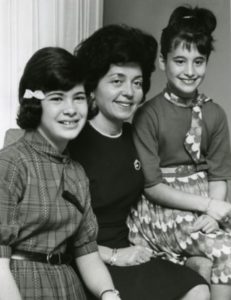
While still at Harbord, Feldbrill made his local conducting debut on February 25, 1943 with the University of Toronto Symphony Orchestra, which had been founded in 1934 by his friend and mentor John Weinzweig. A month later he appeared as a conductor with the Toronto Symphony Orchestra in a performance of the waltz Artist’s Life by Johann Strauss II. It was while he was a student at Harbord that Feldbrill met Zelda Mann (1925–1995), whom he would marry on December 30, 1945. The couple had two daughters, Deborah and Aviva, and remained committed partners in life until Zelda’s death in 1995.
After graduating from Harbord, Feldbrill joined the Royal Canadian Navy as a violinist for the Meet the Navy show in 1943. This was a musical revue that played for enlisted servicemen and civilians across Canada and then travelled to the United Kingdom in 1944 and to Europe in June 1945. The quality of the show was outstanding, and it gave command performances for Prime Minister Mackenzie King in Canada and the British royal family in the UK. Feldbrill took advantage of his time in the UK to sit in on rehearsals of several professional orchestras. He also met many leading British musicians and had lessons with Herbert Howells (harmony) and Ernest Read (conducting).
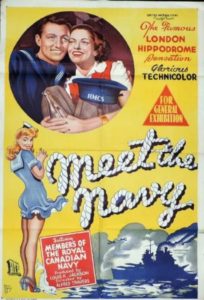
Returning to Canada after Meet the Navy disbanded, Feldbrill began studies on a Department of Veteran Affairs grant in the Artist Diploma program at the Toronto Conservatory (renamed the Royal Conservatory in 1947), studying violin with Kathleen Parlow, an eminent Canadian violin soloist and former pupil of Leopold Auer in St. Petersburg. His fellow students at the time included John Beckwith, Harry Freedman, and Harry Somers. Graduating in 1949, Feldbrill joined the first violin section of the Toronto Symphony Orchestra; he also conducted pops and children’s concerts with the orchestra. He took every opportunity to further his conducting studies, travelling to Tanglewood (for lessons with Robert Shaw, 1947); Maine (Pierre Monteux, 1949 and 1950); Hilversum, Netherlands (Willem van Otterloo, 1956); and Salzburg (Meinhard von Zallinger, 1956).
In addition to his work with the TSO, Feldbrill enjoyed conducting opportunities with CBC orchestras, including the flagship CBC Symphony Orchestra in Toronto, on both radio and television. From 1957 until the 1980s he made regular guest appearances in the UK with various BBC orchestras, often introducing Canadian works in his programs there.
In 1956 Feldbrill resigned his position as a violinist with the Toronto Symphony to devote himself to a full-time conducting career. It was a brave move, especially considering that he did not have a permanent position with an orchestra at the time. After a year as an assistant conductor with the Toronto Symphony (1956–57), he took over the reins of the Winnipeg Symphony Orchestra in 1958 as the ensemble’s second music director, succeeding Walter Kaufmann, who had led the group for ten years. Under Feldbrill the orchestra expanded in size and became a full-time professional organization; at the end of his tenure it moved into the newly built Centennial Concert Hall, which remains its main concert venue.
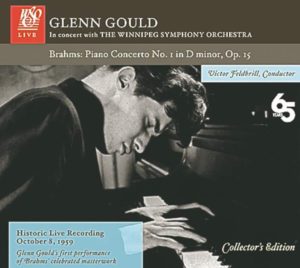
Among the many eminent guest soloists that Feldbrill worked with in Winnipeg was Glenn Gould, who played his first Brahms Piano Concerto No. 1 in D minor there in October 1959. The performance was released on the WSO Live label in 2012 to mark the orchestra’s 65th anniversary (it had earlier been released on the West Hill Radio Archives label in 2011). Feldbrill gave the first performances of many Canadian compositions in Winnipeg, reflecting his life-long dedication to the work of Canadian composers. In 1967 he was awarded the Canadian Music Citation from the Canadian League of Composers in recognition of his efforts in promoting Canadian music. Feldbrill returned to conduct the Winnipeg SO in March 2004 to mark his 80th birthday, and again in 2017, at the age of 93, for the opening concert of the orchestra’s 70th anniversary season. He was also a special guest conductor with the Toronto Symphony in January 2017, in a concert marking the 150th anniversary of Canadian Confederation.
During the Winnipeg years, Feldbrill maintained a busy schedule of guest appearances across Canada and abroad. He conducted the first performances of the Harry Somers / Mavor Moore opera Louis Riel for the Canadian Opera Company in 1967, as well as revivals in 1968, 1969 (for CBC TV), and 1975 (in Washington, DC). (He also led the premieres of the Somers operas The Fool in 1956 and Serinette in 1990). He conducted orchestras in the Soviet Union in 1963 and in December 1966 and January 1967, introducing Canadian works such as Pierre Mercure’s Kaleidoscope and Weinzweig’s Symphonic Ode to audiences behind the Iron Curtain.
Upon finishing his contract in Winnipeg, Feldbrill returned to his hometown to become the conductor of the University of Toronto Symphony Orchestra in 1968. He would remain on staff at the University of Toronto until 1982, returning numerous times thereafter as a guest conductor; his last appearance was in April 2013, just after his 89th birthday, during his term as the Wilma and Clifford Smith Visitor in Music at the university. In addition to leading the UTSO in the great works of the standard orchestral repertoire, Feldbrill introduced much Canadian music to his young charges. To mark the end of his 14-year stint with the university, Feldbrill led the UTSO in a performance of Mahler’s Second Symphony in 1982. [The last 16 minutes of that performance can be heard online here.] The program on that occasion noted that 166 musicians who had played under Feldbrill in the UTSO went on to professional careers as orchestral players, and it listed 122 different works by 59 composers that he had programmed, including four world premieres and four Canadian premieres.
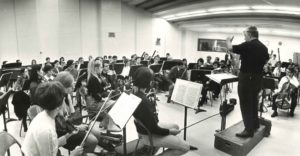
Feldbrill’s work with young musicians included appearances on many occasions with the National Youth Orchestra of Canada between 1960 and 1975, and serving as the founding music director of the Toronto Symphony Youth Orchestra from 1974 to 1978. He worked with young orchestral musicians at the Banff Centre, the Vancouver Academy of Music, and during summer workshops in the Czech Republic. During the 1980s he devoted much energy to training young orchestral musicians and aspiring conductors in Japan at the Tokyo National University of Fine Arts and Music, where he was on faculty from 1981 to 1987 and led the university’s Geidai Philharmonia Orchestra. That appointment led to many further guest conducting appearances in Japan, China, and elsewhere in the Far East.
A recurring role that Feldbrill played throughout his career was rescuer of orchestras in need. An early example was when at short notice he was named the resident conductor of the Toronto Symphony upon the unexpected death of its music director, Karl Ančerl, in 1973. In 1979 he stepped in to lead Ontario’s London Symphony Orchestra, which was experiencing one of its periodic financial and artistic crises at the time. He served for two years as acting music director, reviving the orchestra’s morale and finances. A decade later he stepped in under very similar circumstances to help out the Hamilton Philharmonic, first as interim music adviser and then as music director. For the National Arts Centre Orchestra, he led a 1992 Canadian tour of 32 cities to mark the 125th anniversary of Confederation.
After the death of his wife Zelda in 1995, Feldbrill found consolation in a relationship with Mae Bernstein, a widow and amateur violinist who would be his devoted companion for the last 24 years of his life. They divided their time between residences in Toronto, New York, and Florida. Feldbrill continued to conduct on a reduced and more leisurely scale with amateur groups in Florida and Canada, mixed in with occasional guest appearances with professional orchestras.
Over the years Feldbrill received a long list of honours and awards, including Captain of the Manitoba Order of the Buffalo Hunt (1968), Honorary Fellow of the Royal Hamilton College of Music (1978), the inaugural Roy Thomson Hall Award (1985), investiture as an Officer of the Order of Canada (1986), an honorary LLD from Brock University (1991), appointment to the Order of Ontario (1999), Queen Elizabeth II Golden Jubilee Medal (2002), Ambassador of the Canadian Music Centre (2009), Queen Elizabeth Diamond Jubilee Medal (2012), Honorary Fellow of the Royal Conservatory of Music (2014), winner of the Sir Ernest MacMillan Memorial Award (2014) and a Lifetime Achievement Award from Toronto Musicians Association (2014). A biography by Walter Pitman, Victor Feldbrill: Canadian Conductor Extraordinaire, appeared in 2010 from Dundurn Press.
During his 75-year career, Feldbrill achieved prominence as a violinist, a conductor and orchestra builder, a promoter of Canadian music, and a superlative educator of young musicians. He retained an infectious enthusiasm for and commitment to music until his final days. His many contributions to Canadian music are unparalleled and will always be remembered. He is survived by his companion Mae Bernstein, his sister Eileen Cohen and her husband Mel, his two daughters Debbi Ross and Aviva Koffman and their husbands, and by six grandchildren and nine great grandchildren.
